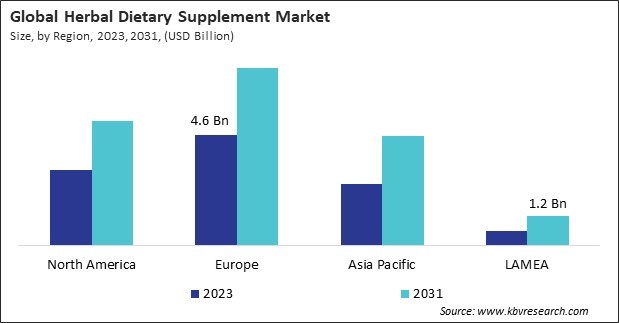According to a new report, published by KBV research, The Global Herbal Dietary Supplement Market size is expected to reach $18.3 billion by 2031, rising at a market growth of 6.9% CAGR during the forecast period.
The Home Use segment is leading the Global Herbal Dietary Supplement Market, by End User in 2023; thereby, achieving a market value of $7.4 billion by 2031. Consumers prefer herbal supplements for home use because they are convenient to purchase and consume without requiring a prescription. Herbal supplements can seamlessly fit into daily home routines, whether as part of morning or bedtime rituals, empowering individuals to manage their health and wellness goals at home conveniently. Consumers can choose supplements tailored to their specific health needs, such as immune support, joint health, or stress relief.

The Powders segment is registering a CAGR of 7.1% during (2024 - 2031). Powders offer flexibility in dosage adjustment, allowing consumers to customize their intake based on individual health needs and preferences. This flexibility appeals to consumers looking for personalized health solutions. Powdered supplements are often formulated for quick absorption by the body, promoting a faster onset of effects than tablets or capsules. This appeals to consumers seeking rapid results from their dietary supplements.
Full Report: https://www.kbvresearch.com/herbal-dietary-supplement-market/
The Europe region dominated the Global Herbal Dietary Supplement Market, by Region in 2023, and would continue to be a dominant market till 2031; thereby, achieving a market value of $7.4 billion by 2031. The North America region registers a CAGR of 6.7% during (2024 - 2031). Additionally, The Asia Pacific region would showcase a CAGR of 7.6% during (2024 - 2031).
By End User
By Product Type
 Unique Offerings
Unique Offerings